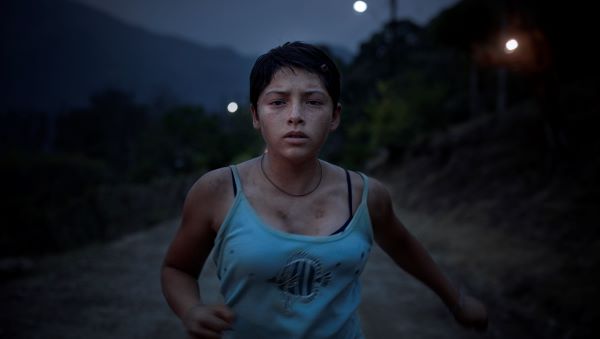![]() From the perspective of a child—and teenagers to a certain degree—life experiences remain simple, almost like a game until it’s not fun anymore. It’s precisely this straightforward and innocent way of perceiving the world, despite how complicated and rough the surroundings, that is remarkably depicted in the first feature film by Tatiana Huezo, the splendid Prayers for the Stolen. The Mexican filmmaker focuses on three girls (and later as adolescents) growing up in a dangerous environment from their perspective. Otherwise, it would likely have been an almost unbearable film to watch.
From the perspective of a child—and teenagers to a certain degree—life experiences remain simple, almost like a game until it’s not fun anymore. It’s precisely this straightforward and innocent way of perceiving the world, despite how complicated and rough the surroundings, that is remarkably depicted in the first feature film by Tatiana Huezo, the splendid Prayers for the Stolen. The Mexican filmmaker focuses on three girls (and later as adolescents) growing up in a dangerous environment from their perspective. Otherwise, it would likely have been an almost unbearable film to watch.
The foundation for the film, though it’s not a strict adaptation, is American-Mexican Jennifer Clement’s 2012 novel, set in a remote Mexican town controlled and guarded by a drug cartel. The nearby poppies fields are the main source of employment and income for the residents, the majority of whom are single mothers and their children, families neglected by men who left to find a better life and earn money.
The first time we see Ana (Ana Crístina Ordóñez González), she is an eight-year-old girl very much alive though lying in a hole in the ground shaped like a grave, which has been dug out by Rita (Mayra Batalla), her mother. A later scene will reveal its practical purpose. In Rita’s case, her absent man has not called or sent money in a long time. Trying to do her best but on the path of becoming a heavy drinker, she becomes another local recruited by the cartel to extract opium from the poppy’s seeds (a process shown with clinic detail). There is an extra worry for Rita: one of the cartel’s black SUVs might drive to her home to collect her daughter at any time and without any explanations and by force.
For Ana and her friends, Paula (Camila Gaal) and María (Blanda Itzel Pérez), the worries that keep adults awake never rob them of their peace nor deter them from their shared games. Not yet. Their bond as close friends remain as they grow up. The three friends learn to create a private world of games and adventures, even trying to communicate themselves telepathically. Games are not always enough to escape completely, as when Ana hears a woman crying for a disappeared girl she used to play with, and then the mother also disappears the next day.
In another scene, Ana and Paula are taken by their mothers to the hairdresser to cut their hair—they will look like boys. This is a painful moment for Ana, who cannot stop crying. She’s observed by a concerned Paula, who knows she’s next to get her hair cut. Their mothers blame head lice as the cause for the new look, but the girls don’t understand why María was exempted from the treatment. “She has strong genes” is the response. The girl in question has a cleft lip, and presumably not as desirable to the cartel. Huezo uses this mundane moment as Ana’s wake-up call, as proof of the imperceptible ways she starts to realize what’s going on and decipher the adults’ language, full of coded words and white lies. We can pinpoint the loss of innocence in moments like this.
The transition to the girls becoming teenagers is smooth, with three new actresses playing and equaling their talented child counterparts: Mayra Membreño (as Ana), Alejandra Camacho (Paula), and Giselle Barrera Sánchez (María). In this second half, the film portrays the girls as a logical combination of naïve adults and premature children (they start to work in the fields, while they continue studying to complete the sixth grade). With their hair still short (except María) and practicing their telepathic games, they also share impressions about their crushes (the new teacher or the handsome local boy—Maria’s brother—who now has grown-up). The menace of being collected is also as high as ever, and it’s not a surprise that this story won’t be a sugarcoated fairytale. Prayers for the Stolen never reveals the perpetrators’ faces and only tangentially disclose their crimes. When it does, the result is infuriating.
Will streaming on Netflix increase this film’s audience? Hopefully. Submitted as Mexico’s entry for the Best International Feature Film Oscar, Huezo has directed one of the best and most urgent Latin American films of the year.

















Leave A Comment